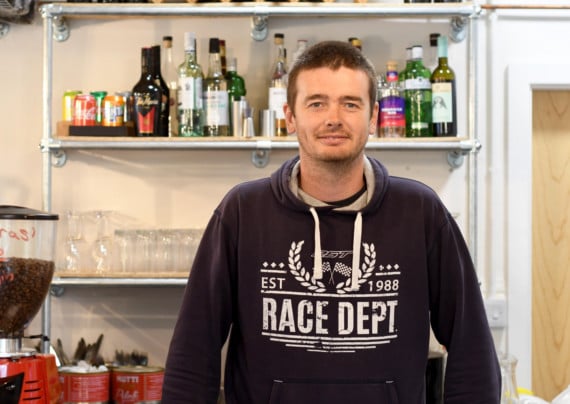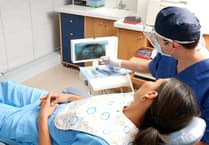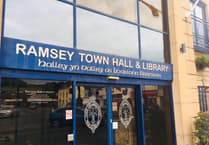Sport can teach some cruel life lessons at a very young age.
When he was just 19, TT star Conor Cummins had been showing promise in short circuit races in the UK but he had not been picked up by a team to go on to do the bigger race series.
He says: ’I actually went through a really low point in my life there. I thought "this is it, the dream’s over. It’s time to get real and work for my money".
’It was a tipping point of my career where I realised it was time for a different challenge.’
He turned to road racing: ’The North West 200 was the obvious one for me and, once I’d made that decision, it was a case of "I might as well do the TT as well, it’s there on my doorstep". So it all sort of fell into place quite nicely.
’After doing the North West 200 it was like a light bulb moment this is what I’m gonna do and I’ve managed to forge a reasonable career out of it.’
His performance as a newcomer at the North West 200, Ireland’s premier road race, was so good he was picked up by a team which supported him through his first TT where he was best newcomer and a clocked a 120mph average lap.
Four years later, however, came his spectacular and very well-documented accident. The video of him flying off the skidding bike at the Veranda and bouncing over a stone wall like a rag doll went viral. Conor broke his back and shattered a leg and an arm.
’That was another light bulb moment where I thought I needed to be looking at additional things in my life as well. I went from having a large percentage of my body beaten about, not knowing where my income was coming from, to "right, I want to continue racing bikes but at the same time I’ve got to have a back-up plan so let’s assess it and make a plan" and I really set that in motion.’
He says that working with his sponsors had given him an understanding of how their businesses worked and it had started to fascinate him.
He was also, during his rehab, introduced to coffee, which he had never drunk before. ’What I found was that I was on so much medication at the time and I believe the caffeine took the edge off the pain I was feeling,’ he said.
’I think the coffee helped with my recovery.’
Nine months later he was back racing bikes but the idea of starting a business had not gone away. Instead, he was obeying the cardinal rule for any new money-generating idea. He was doing his research.
He says: ’All through rehab I knew I needed something else for my future in case the bikes didn’t work. That was my awakening, all prompted by my crash and I did about four years’ worth of research. I didn’t rush into it. I really thought about what I wanted to do.’
He had also met someone who was supplying quality coffee in the UK.
He says: ’Bike racing brings so many communities together. I’ve got really good friends and one of them runs a reputable coffee business off island. I saw a gap in the market doing mobile coffee for events, so I said: "I’ve got this idea - what do you reckon?"
’Fast forward a few years and we arrived at our first event in 2015 with our three wheeler Piaggio Ape van.
’It’s just snowballed from there.’
This then led on to him supplying commercial coffee machines. ’Once I found my feet in the industry, much the same as I saw an opportunity in events, I saw an opportunity in the supply of coffee machines. I set to, trying to understand how that works.’
The next step was setting up his first high-street coffee shop, Conrod’s in Ramsey:
’We knew from our events that we could make a great coffee - the product was solid so to do a coffee shop was very obvious.
’At first it had no kitchen: we just focussed on coffee and cake and outsourced the sandwiches.’
Conrod’s now has a full kitchen, serving a wide range of food, and Conor has gone on to open a second eatery, a pizzeria in Mooragh Park.
Interestingly, he says that, when he first started out on his business career he was ’hellbent on not using my own name, I wanted to keep it totally separate’.
However, attending a ’brilliant’ marketing course organised by DEFA, it was impressed on him how important it was to use his strengths, his name definitely being one of those.
He says: ’I probably went two years without trying to tie [my name] in and then Conrod’s happened. Any people associated with racing know that my nickname is Conrod.
’Where it helped is getting [my business] out to the masses, bike fans, my audience. On social media I posted: "I’m starting Conrod’s coffee shop in Ramsey - be great to see you there".’
He has also spotted that something else still works for publicising the business. He says: ’We still love doing the mobile coffee van. Of late I’ve understood that that’s the opportunity to get your message out there, to your potential customers, so we still do the events including the Food Festival. That speaks to your customers.’
He is still racing. After a lean spell during lockdown when the island’s borders were closed, he was away racing at the weekend.
He says: ’I’m very, very passionate about it. You learn from a young age it’s the rough with the smooth and I’ve had a fair mixture.
’But I’ll know when enough’s enough: I’ve got a family now.’
Conor’s wife, Danielle, is an English teacher and they have two young daughters, Connie who is nearly three and Imogen who is 18 months.
His businesses, Coffee Man and the two Conrod’s eateries, are all doing well.
For the future, he says: ’The plan is to grow all three businesses. I think the whole of the world is going to be going through a bit of a recovery phase after Covid.
’How long that will last for I don’t know, but I’ve got three strong businesses and the plan is to make them stronger, make them grow, look for new business, and continue to provide a solid service and product.
’I would love to take the business off island as well, there’s big potential there.’
When first he opened Conrod’s there were already 35 eateries listed in Ramsey and he is quite clear about why his have been successful: ’We knew we had to do a better product to compete.
’I believe that it’s no use having a nice name if nobody’s going to come and eat and drink in there - the product’s got to be good and that’s what I believe brings the customers back.
’It’s your customers’ hard-earned money so, if they’re handing pound notes over to you, the product better be good.’

.jpg?width=209&height=140&crop=209:145,smart&quality=75)



Comments
This article has no comments yet. Be the first to leave a comment.